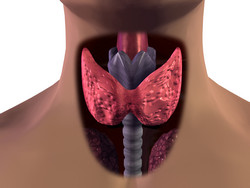Oxidative stress and thyroid cancer
Oxidative stress causes protein and lipid damage as well as mutations and epigenetic perturbations, thereby leading to disorders like cancer and neurodegeneration. The thyroid gland has antioxidant and detoxification enzymes that helps it withstand oxidative stress and maintain homeostasis during iodine metabolism for hormone synthesis. Surprisingly, the underlying mechanisms are yet to be elucidated. In oxidative stress, NFE2-related transcription factor 2 (Nrf2) accumulates in the nucleus and transcriptionally activates protective genes through antioxidant response elements (AREs) in their regulatory sequences. Also it is suppressed during normal aging and aberrantly activated in many cancers. The EU-funded THYROIDANTIOXIDANT (Role of the Keap1/Nrf2 antioxidant response system in thyroid gland homeostasis and thyroid cancer) project investigated the role of Nrf2 in thyroid gland homeostasis and thyroid cancer. Scientists manipulated the Nrf2 pathway experimentally to find that activation increases resistance to oxidative insults, whereas inhibition compromises thyroid cell survival. In addition, Nrf2 controlled the expression of genes fundamental for thyroid hormone synthesis and was essential for thyroid autoregulation in response to iodine availability. With respect to thyroid cancer, genetic analysis of archived samples revealed no mutations in Nrf2. However, the pathway was indeed activated compared to normal thyroid tissue, indicating that other genetic or epigenetic events must be implicated. An activated Nrf2 pathway possibly translates into protection of transformed thyroid cells from oxidative stress. Collectively, the project results underscore the role of Nrf2 in thyroid gland maintenance and in thyroid cancer. Nrf2 inhibitors are currently in development by several companies and might be useful in treating radioiodine-refractory or metastatic thyroid cancer.
Keywords
Oxidative stress, thyroid cancer, detoxification, iodine metabolism, homeostasis, Nrf2

